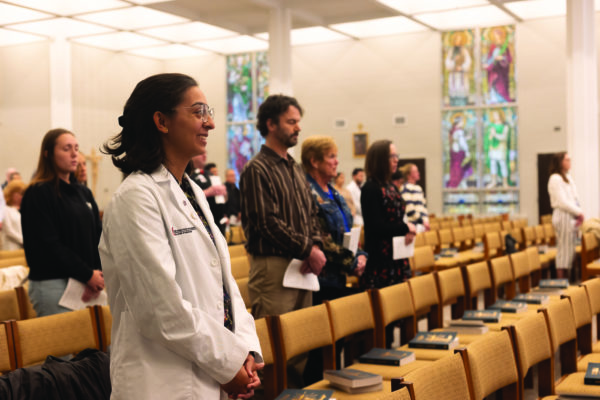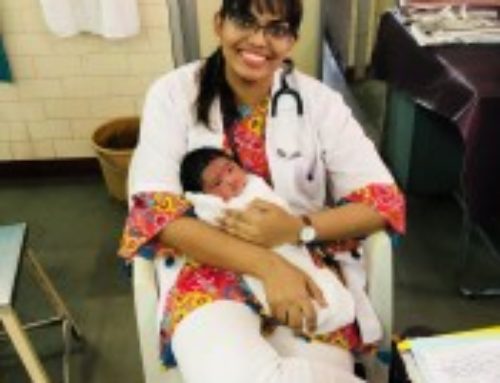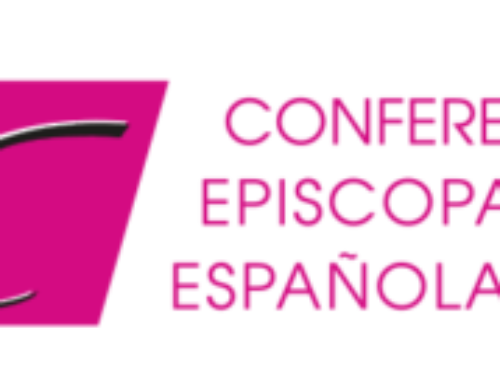White Mass brings together Catholic medical professionals
BY HANNAH HEIL OCT 30, 2023 LOCAL
The annual White Mass sponsored by the Catholic Medical Association of Central Ohio brings together students and professionals in health care fields. This year’s White Mass on Wednesday, Oct. 18, the feast of St. Luke, was offered in the St. Thomas More Newman Center chapel. Photos courtesy Abigail Pitones
For Catholic health-care professionals, the medical field at times can be a lonely place. Defending the Gospel of Life and adhering to Church teaching while facing opposition from both inside and outside the field is difficult.
Many Catholic nurses, doctors, medical students and others who work in health care find consolation and support by uniting in their faith.
They had that opportunity on Wednesday, Oct. 18, at the White Mass.
The Mass was celebrated by Bishop Earl Fernandes at the Columbus St. Thomas More Newman Center, adjacent to Ohio State University. Catholics in the health-care profession attended the Mass.
“The White Mass is named because doctors wear a white coat, and … it’s a reminder of the days when nurses all wore white uniforms,” said Michele Faehnle, a school nurse at Columbus St. Andrew School and school nursing adviser for the diocese’s Office of Catholic Schools.
The Mass is traditionally organized by Columbus’ Catholic Medical Association.
“The Catholic Medical Association is a physician-led organization open to all health-care practitioners and students in the health-care professions,” said Dr. Marian Schuda, a Columbus physician specializing in geriatric medicine and secretary of the local association board.
“It’s a good thing to be able to pray together and collaborate and visit with other like-minded health-care professionals, and then we go out into the world of health care and try to do our best to stay true to the values espoused by us in our faith.”

The bishop was joined by several diocesan priests, including Father Mark Hammond, the pastor of Mount Vernon St. Vincent de Paul and Danville St. Luke churches, who was a nurse before becoming a priest, and Father Robert Penhallurick, the pastor of Hilliard St. Brendan the Navigator Church and association chaplain.
Also present were Father Bill Ferguson, the parochial vicar of Delaware St. Mary Church and local chaplain of Courage, a ministry providing pastoral care to those experiencing same-sex attraction; Father Adam Streitenberger, the executive director of the Newman Center; and Deacon Dr. Stephen Petrill, a deacon at Dublin St. Brigid of Kildare Church and professor of psychology at Ohio State University.
The Mass is traditionally held on or near Oct. 18, the feast of St. Luke, who is the patron saint of physicians. St. Luke was an evangelist and author of one of the four Gospels and the Acts of the Apostles, as well as a physician.
“Gathering together with other health-care professionals to celebrate our Catholic faith and knowing others have the same values and ethics is very important to me,” Faehnle said. “Practicing our faith in our secular society has very unique challenges, so knowing you have support from other health-care providers is a powerful witness and inspiration.”
It can be difficult to know how to approach certain problems in the medical field. One of the main challenges today, Schuda said, is faced by physicians involved with reproductive specialties.
In Ohio, a proposed amendment to the state constitution, Issue 1, is on the Nov. 7 ballot. If passed by voters, it would enshrine abortion through all nine months of pregnancy in the state constitution.
With the passage of the amendment, abortion would be safeguarded in Ohio until fetal viability, which is around 22 weeks, or nearly six months, of pregnancy. Any individual, meaning a woman or a girl without needing parental consent, could obtain an abortion after fetal viability until the moment of birth if a physician, who could be the abortionist, signs off.
“Hopefully we’ll see that the people of Ohio aren’t ready to throw the doors open wide on that,” Schuda said.

Performing an abortion contradicts a Catholic physician’s religious values.
“We honor the dignity and worth of every person as made in the image and likeness of God, regardless of that person’s age, state of ability or really anything else,” Schuda said. “So, I mean a newly conceived but not yet born person is also made in the image and likeness of God, and his or her life deserves protection, so that includes the preborn child.
“In a lot of these arguments, we hear about reproductive rights …, but I’m not hearing people talk about what do we owe to that baby, who’s also a separate person. The Catholic Church, it’s not the only one, but it’s one of the main voices reminding us that there’s another person involved here.”
Talia Caridi, a second-year medical student at Ohio University Heritage College of Osteopathic Medicine, said she enjoys gathering with Catholics to pray for the “manifestation of God’s kingdom” on earth, especially in health care.
“As a Catholic medical student, the White Mass is a reminder that I am not alone in my moral convictions about the sanctity of all human life and that I need not rely on my own power and strength to challenge the culture of death,” she said.
Caridi is a parishioner at Columbus St. Catharine Church and is studying to be an obstetrician and gynecologist. She has concerns about Issue 1 and how the proposed amendment could affect her work.
“As a future physician, I am convicted that Issue 1 will radically transform care for pregnant women and their preborn children – and not for the better,” she said. “I am deeply concerned that my work as a pro-life OB/GYN will be hindered, if not thwarted, by the mandates of this issue to ‘not interfere’ at all in the procuring of abortion.
“The White Mass and community event following it is a vital step toward uniting Catholics in medicine as we continue to uphold the sanctity of life in all its stages.”
Maximilian George, also a second-year medical student at Ohio University who is studying at the medical college’s Dublin campus, attended the White Mass. He said it is special to celebrate the Catholic faith with other health-care professionals.
“It is always heartening to connect with others who share my beliefs, especially when it can be challenging to do so on a daily basis,” he said.
George, who is originally from Beavercreek, Ohio, attends Columbus St. Patrick Church with his wife, Erin, and their 5-month old daughter, Zelie Rose. He said the White Mass is timely this year.
“This Mass is especially important in light of the upcoming November election,” he said. “Through the celebration of the life-giving gift of the Eucharist, we reaffirm our commitment as health-care providers that we will cherish, protect and care for all life, no matter how small.”
In his homily, Bishop Fernandes affirmed that Catholic health-care professionals proclaim the Gospel of Life through their work.
He said there are people who do not want the Word of Life to go forth. Many early Christians, such as St. Paul, were persecuted for spreading the Gospel message.
“Despite the persecutions, the Word went forth because the mission of the Church is a spirit-driven event – a spirit-driven event – and if God is for us, who can be against? These are the things St. Luke recounts in the Gospel and the Acts, and we have much to learn from him,” Bishop Fernandes said.
He told those gathered that they, too, will be persecuted for spreading the Word of God today, and they will face setbacks. The bishop said not to be discouraged; the Apostles experienced many setbacks, but the Word of God went forth.
“We should not be ashamed to be more bold,” he said.
Bishop Fernandes asked those present: “How can we not speak about the Name (of God)? How can we not, knowing what God has done for us?”
He said there are several themes in the Gospel of Luke: preferential option for the poor, the universality of salvation – that salvation is not only for Jews but also Gentiles – and the role of foreigners, the foundation of the Church and God’s mercy.
Bishop Fernandes recalled the 10th chapter of St. Luke’s Gospel, which includes the story of the Good Samaritan, when a man fell victim to robbers and was left half-dead in the road. A priest and Levite walked by the man, but a Samaritan, a foreigner who was despised by the Jews, stopped to help, bandaged the man and cared for him.
The priest and the Levite wondered, perhaps, “What will happen to me if I stop to help?” But, the bishop said, the Samaritan asked a different question: “What will happen to him if I do not stop to help?”
“A doctor finds himself in front of a sick patient; the doctor has the skills to bring that patient – another person made in God’s image and likeness – to health, and he or she does all in his power to do just that: to restore the person to health and to life – a great good, a great gift from God.”
Christ is truly the Good Samaritan, the bishop said, Who heals wounds and shows mercy. Christ tells his followers to go and do likewise.
The bishop also reflected on the daily Gospel reading (Luke 10:1-9) when Jesus appointed and sent out 70 people, in pairs, to cure the sick and proclaim that the kingdom of God is near.
“The miracles of healing throughout the Gospels are all signs of the proclamation of the kingdom of God,” Bishop Fernandes said. “It is no coincidence that in tonight’s Gospel we heard, ‘Cure the sick and proclaim the kingdom of God is at hand for you.’
“To you, who have been called to the healing arts, your ministry, your vocation, your profession, they’re all sort of intertwined, but what you are really doing is assisting in the proclamation of the kingdom of God.”
Mary Hyland, a third-year medical student at Ohio State University College of Medicine, said her Catholic faith is the driving force behind her desire to be a physician.
“Throughout my first few years of medical school, I have seen how the practice of medicine largely aligns with Jesus’ message of healing in the Gospels,” she said. “Everything we learn as future physicians is meant to prepare us to steward the gift of life and uphold the dignity of those who face illness.”
Hyland, who attends St. Catharine Church and is from Cleveland, is interested in pediatrics and emergency medicine. She sees the work of a physician as being the hands and feet of Christ, as they actively care for those in need. She said it is important, for this reason, for Catholic physicians to unite in their faith.
“Coming together to celebrate the Most Holy Eucharist is essential as we strive to support each other in our call toward being the hands and feet of Jesus to our patients,” she said. “It leads us into deeper relationship with Christ, Who is the ultimate healer.”
Caridi said that she is “ever more in awe of God the Creator” as she studies the human body.
“My faith gives me the strength to study well and to connect the sufferings of my patients with that of our Lord on the cross,” she said.
Caridi said that even more important than medicine is the work that all people are called to do: give praise and worship to their Creator.
“The White Mass is an opportunity to engage in the most important work we will perform as human beings: liturgical worship.”








